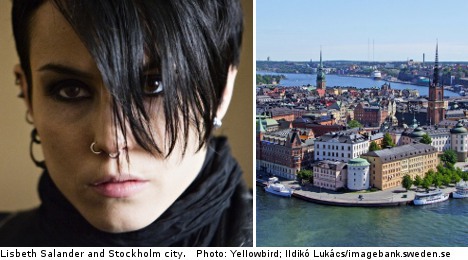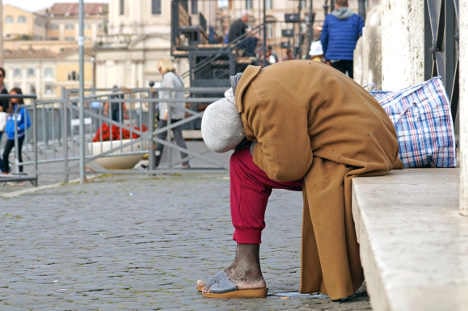“Looking at what has been written in the foreign press about Larsson and the Millennium trilogy, a darker – but also more multi-faceted image of Sweden emerges,” media analyst Joakim Lind tells The Local.
According to Lind, the Sweden of the Millennium books has seriously challenged the stereotypical image of Sweden that existed before.
A Sweden of Ikea, Volvo and the welfare state has given way in some extent to a more modern and realistic Sweden with its fair share of crime, injustice, and violence.
The conclusions drawn by Lind, an analyst with Swedish PR firm Cloudberry Communications, are detailed in a recently released study he carried out for the Swedish Institute.
Lind’s report shows a new image of Sweden emerging in the international consciousness – not in the least through the fictional oeuvre of world-acclaimed crime writer Stieg Larsson.
In the study, Lind reviewed a large number of articles pertaining to Stieg Larsson and his writing, including book reviews, travel features and news articles.
The success of the Millennium books has sparked a huge interest in Sweden on the part of tourists, spawning guided tours in the capital which take participants in the author’s and his characters’ footsteps.
Lind argues that it is this geographical anchoring, as well as the connection to events in Sweden from the end of the 1980s and until present day that have brought Larsson’s books the success that have attained among readers abroad.
“The new image of Sweden has more depth and it has made the country more interesting abroad. There is a feeling that ‘finally the front has been removed’ and we can talk about the issues that challenge all modern nations,” he explains.
The fact that these issues were broached first through fictional narrative may have had an impact on how the audience has engaged with the new image of Sweden that emerges in the novels, according to Lind, sparking a curiosity to find out what lies beyond the stereotypical image of Sweden.
While Larsson wasn’t the first author to do this, the international success of his books has exposed an ever-growing audience of people outside of Sweden to an image of the country that stands sharp contrast to the progressive, socially liberal utopian ideal that prevailed previously.
“And that means that the image of Sweden visible through Larsson’s narrative is bringing up issues such as violence, extremist groups and violence against women, not just in Sweden but also abroad,” Lind says.
It was this more sinister image of Sweden that King Carl XVI Gustaf in 2011 said he was worried about; a Sweden much darker than he recognized his realm to be.
But working on the study, Lind found that as Sweden has lost some of its reputation as the “impeccable nation” among the foreign press, it has actually become easier for journalists from abroad to relate to the country.
“Sweden now stands out as a country which no longer can or needs to pretend to be something other than what it is and has been. A country which faces the same challenges as most other countries”, Lind writes in his report.
Swedish journalist Arash Mokhtari, who is active in the organization Quick Response, which investigates how the Swedish media report on immigration, integration and xenophobia, took part in a recent panel debate about the study, and agrees that the image of Sweden is changing, both within the country and abroad.
“There is definitely something happening with the Swedish self-image, largely thanks to good domestic investigative journalism,” he tells The Local.
Fifteen or twenty years ago, Swedes were far more likely to hide behind the image of the country as a paragon of justice, but today there is more humility among citizens, according to Mokhtari.
“There have been so many instances where Swedes have been forced to face up to the fact that the country is in no way infallible,” says Mokhtari, bringing up examples such as Sweden’s involvement in the building of a Saudi arms plant, the rendition of two Egyptian citizens at the behest of the CIA, and of recurring coverage of violence against women.
In his work, Mohktari has met a lot of foreign journalists, and has seen the consequences of the stereotypical image of Sweden.
When talking to audiences or groups in Eastern Europe of hidden racism in Sweden, for example, Mokhtari has often been met with the feeling that it is a “luxury” to battle racism at that level; that there are places not far away where the situation is far worse.
“And that does not lead to a constructive discussion,” he points out.
Instead, the evolution of the international image of Sweden has led to greater understanding and more opportunities to exchange experience and views on the challenges facing most countries, such as everyday racism, sexism or violence.
This view is also shared by feminist journalist Sonja Schwarzenberger, one of the instigators of the Twitter hashtag #prataomdet or #talkaboutit. She also won Sweden’s most prestigious prize for journalism, Stora Journalistpriset, for efforts to get Swedes to share their stories of the grey areas of non-consensual sex.
In her experience when travelling abroad, Schwarzenberger finds the image of Sweden among those she meets is that as a socialist paradise – the exception that proved that the model was possible.
“When I said there were injustices and suffering in Sweden too they were disappointed and surprised,” she tells The Local.
And in her work with #prataomdet, which also sparked interest internationally, Schwarzenberger was often met with confused journalists saying, “But I thought you were liberated?”
“I tried to explain that that was the reason we could even have this discussion in Sweden and also that the question of men’s violence against women is still a highly controversial topic, even here,” Schwarzenberger says.
Both Schwarzenberger and Mokhtari agree, however, that the fact that these issues have been brought out in the open – through fiction or fact – gives others a reason to compare and discuss them in way that wouldn’t be possible otherwise.
And according to Lind, Larsson’s Millennium books will, in the long run, serve as a portrayal of Sweden in the early years of the 21st century.
“But as many of the issues brought up in the books have been topical for hundreds – if not thousands – of years, they will continue to be topical from different angles for centuries,” Lind writes in the report.
“They will also be read and given a renewed relevance by the time and place in which they are read.”
Rebecca Martin



 Please whitelist us to continue reading.
Please whitelist us to continue reading.
Member comments